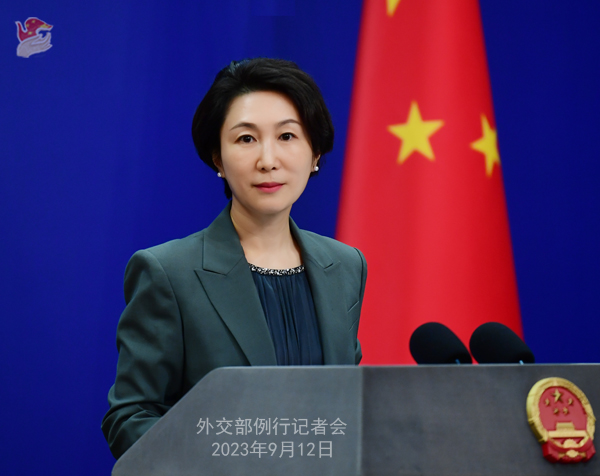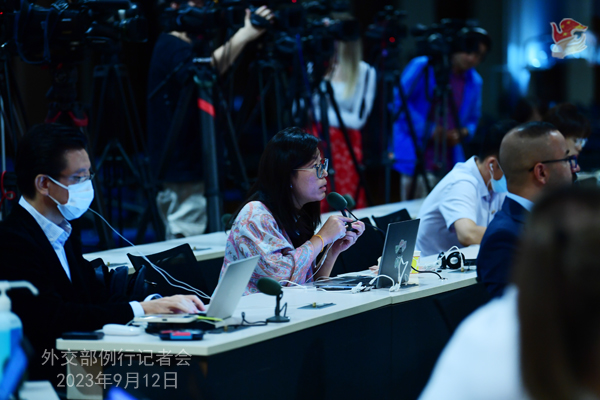| Foreign Ministry Spokesperson Mao Ning’s Regular Press Conference on September 12, 2023 |
| 2023-09-12 17:31 |
|
Global Times: Recently, many western countries have talked down China’s economy. US President Biden said China’s growth was slowing due to a weak global economy as well as Chinese policies. The Australian Treasury Secretary noted that the slowdown in China is having an impact on Australian economy. US Deputy Treasury Secretary Adeyemo said a slowing Chinese economy is going to have an impact, but mostly on its Asian neighbors. What’s your comment? Mao Ning: All sorts of comments predicting the collapse of China’s economy keep surfacing every now and then. But what has collapsed is such rhetoric, not China’s economy. Since the beginning of this year, amid the struggling world economic recovery and a challenging and complex external environment, China’s economy has continued to recover on a generally sound track of rebound. In the first half of this year, China’s GDP grew by 5.5 percent year on year, notably faster than last year’s 3 percent. The IMF predicted that China’s economy will grow by 5.2 percent this year, and contribute one third of the global growth. China’s economy will remain a major engine for the global economy. I want to stress that the Chinese economy’s strong resilience, ample potential and strong vitality and the fundamentals sustaining China’s sound economic growth in the long run stay unchanged. We are confident and capable of promoting the sustained and sound development of the economy. China will remain committed to high-level opening-up, enhance win-win cooperation and share development dividends with other countries. China’s development will bring more opportunities to its Asian neighbors and the rest of the world. Reuters: Russian media have reported that Russian President Vladimir Putin and Chinese Vice Premier Zhang Guoqing will discuss high-level bilateral contact by the end of this year. Could we confirm that they have met? And what were their discussions about? And aside from President Putin, will Vice Premier Zhang be meeting other leaders in Russia, as we have seen reports that North Korean leader Kim Jong Un has arrived in Russia this morning? Mao Ning: Information about Vice Premier Zhang Guoqing’s activities in Russia will be released in due course. Please check back for updates.
CCTV: The IAEA said a few days ago on its website that its first independent sampling and analysis of seawater near the Fukushima Daiichi Nuclear Power Station since discharges of ALPS treated water started confirms that the tritium levels are below Japan’s operational limit. IAEA Director General Rafael Grossi said recently that the IAEA is an international organization with the mission to monitor Japan’s ocean discharge. For other countries to join the monitoring is like asking the IAEA to do the inspection in Iran with a group of countries. What’s your comment? Mao Ning: I noted relevant reports. Japan’s discharge of nuclear-contaminated water into the ocean is an unprecedented move that bears on other countries’ major interest and concern. The IAEA Secretariat’s so-called monitoring is neither mandated by the body’s Board of Governors nor fully discussed by member states. It’s merely the Secretariat’s technical consulting and support for Japan and is neither international nor independent. A total of 7,800 tonnes of nuclear-contaminated water has been dumped into the ocean, and yet the international community still hasn’t been informed of the IAEA Secretariat’s specific monitoring arrangements. The world calls for an international monitoring arrangement that has the full and substantive participation of Japan’s neighboring countries and other stakeholders and will remain effective over the long run as well as a detailed monitoring plan that covers such aspects as the categories of radionuclides, the frequency, the locations, the scope, and the reporting. Japan and the IAEA Secretariat need to respond to these issues in a serious and responsible manner. I also need to point out that no monitoring could be read as an endorsement of Japan’s ocean discharge or give it any amount of legitimacy or legality sought by Japan. Japan should immediately stop shifting the risks of nuclear pollution to the whole world. AFP: The DPRK’s top leader is on a rare diplomatic visit to Russia today. It is reported that he will meet with President Putin. Do you have any comment on the exchange between China’s two “close allies”? Is there any plan to invite Kim Jong Un to visit China in the next few months? Mao Ning: The DPRK leader’s visit to Russia is an arrangement between the two countries. On your second question, I have no information to offer.
Reuters: North Korea’s Kim Jong Un has made a trip to Russia today, his first overseas visit since the pandemic. Does China have any comment given the country’s close ties to both North Korea and Russia? And is there any plan for the leaders of China and North Korea to meet in the near future? Mao Ning: The DPRK leader’s visit to Russia is something between their two countries. China and the DPRK are friendly neighbors connected by mountains and rivers. Our bilateral relations are making sound progress. Both sides are working to act on the important consensus reached by our leaders, deepen exchanges and cooperation across the board, and strive for new and greater progress in our relations. As to the high-level meeting you asked about, I don’t have anything to share. Reuters: South Korean President Yoon said he has called for China to play a responsible role in curbing North Korea’s nuclear and missile threats during his meeting with Chinese Premier Li Qiang last week. Did this matter come up during their meeting? And what was Premier Li Qiang’s response to it? Mao Ning: The ROK President and the Chinese Premier did talk about the Korean Peninsula issues during their meeting. China reiterated its principled position of supporting reconciliation and cooperation between the DPRK and the ROK and safeguarding peace and stability on the Peninsula and expressed its readiness to continue promoting peace talks. Reuters: Italian media reported that the Papal envoy Cardinal Matteo Zuppi will travel to Beijing today in a diplomatic effort to help end the war in Ukraine, and he is likely to meet Chinese leaders on Wednesday. Can we confirm this visit and that the Ukraine conflict will be on the agenda of the visit? Mao Ning: I have no information on that at the moment. Bloomberg: TASS news agency has reported that Russian President Vladimir Putin is expected to hold meetings with President Xi before the end of the year. Could the foreign ministry confirm this? Mao Ning: President Xi Jinping and President Putin have all along maintained strategic communication in various ways and held in-depth exchange of views on China-Russia cooperation and issues of mutual interest. The two presidents will continue their close exchange and guide our two countries’ comprehensive strategic partnership of coordination for a new era to new heights.
|
 | ||||||||||||
 | ||||||||||||
|



